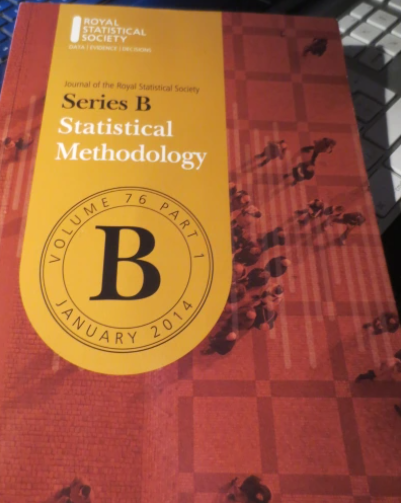中介路径分析中复合零假设的自适应自举检验
IF 3.6
1区 数学
Q1 STATISTICS & PROBABILITY
Journal of the Royal Statistical Society Series B-Statistical Methodology
Pub Date : 2023-11-14
DOI:10.1093/jrsssb/qkad129
引用次数: 1
摘要
摘要:中介分析旨在通过中间变量评估某种暴露是否以及如何影响感兴趣的结果。由于科学领域对这类分析的巨大需求,这个问题最近引起了人们的极大关注。中介效应(ME)的检验受到以下事实的极大挑战:潜在的零假设(即不存在ME)是复合的。大多数现有的中介测试都过于保守,因此功能不足。为了克服这一重要的方法障碍,我们开发了一个自适应自举测试框架,可以在中介路径分析中容纳不同类型的复合零假设。我们的自适应检验程序应用于系数乘积检验和联合显著性检验,在复合null下提供I型误差控制,与现有检验相比,统计能力大大提高。讨论了该方法的理论性质和数值算例。本文章由计算机程序翻译,如有差异,请以英文原文为准。
Adaptive bootstrap tests for composite null hypotheses in the mediation pathway analysis
Abstract Mediation analysis aims to assess if, and how, a certain exposure influences an outcome of interest through intermediate variables. This problem has recently gained a surge of attention due to the tremendous need for such analyses in scientific fields. Testing for the mediation effect (ME) is greatly challenged by the fact that the underlying null hypothesis (i.e. the absence of MEs) is composite. Most existing mediation tests are overly conservative and thus underpowered. To overcome this significant methodological hurdle, we develop an adaptive bootstrap testing framework that can accommodate different types of composite null hypotheses in the mediation pathway analysis. Applied to the product of coefficients test and the joint significance test, our adaptive testing procedures provide type I error control under the composite null, resulting in much improved statistical power compared to existing tests. Both theoretical properties and numerical examples of the proposed methodology are discussed.
求助全文
通过发布文献求助,成功后即可免费获取论文全文。
去求助
来源期刊
CiteScore
8.80
自引率
0.00%
发文量
83
审稿时长
>12 weeks
期刊介绍:
Series B (Statistical Methodology) aims to publish high quality papers on the methodological aspects of statistics and data science more broadly. The objective of papers should be to contribute to the understanding of statistical methodology and/or to develop and improve statistical methods; any mathematical theory should be directed towards these aims. The kinds of contribution considered include descriptions of new methods of collecting or analysing data, with the underlying theory, an indication of the scope of application and preferably a real example. Also considered are comparisons, critical evaluations and new applications of existing methods, contributions to probability theory which have a clear practical bearing (including the formulation and analysis of stochastic models), statistical computation or simulation where original methodology is involved and original contributions to the foundations of statistical science. Reviews of methodological techniques are also considered. A paper, even if correct and well presented, is likely to be rejected if it only presents straightforward special cases of previously published work, if it is of mathematical interest only, if it is too long in relation to the importance of the new material that it contains or if it is dominated by computations or simulations of a routine nature.

 求助内容:
求助内容: 应助结果提醒方式:
应助结果提醒方式:


